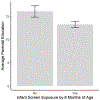Associations among average parental educational attainment, maternal stress, and infant screen exposure at 6 months of age
- PMID: 34509711
- PMCID: PMC8627439
- DOI: 10.1016/j.infbeh.2021.101644
Associations among average parental educational attainment, maternal stress, and infant screen exposure at 6 months of age
Abstract
Evidence suggests that increased use of screens early in life may have negative developmental consequences for children. However, little is known concerning parental factors that predict initial screen exposure in infancy. The primary goal of this study was to examine whether parental educational attainment and maternal stress were associated with infant screen exposure by 6 months of age. A diverse sample of mothers (N = 93) was recruited prenatally. In a follow-up visit when the infants were six months of age (N = 82), we examined factors that may be associated with initial infant exposure to screens. First, mothers reported whether they had already exposed their infants to screens. Thereafter, those mothers who reported already having exposed their infants to screens were further queried to determine the extent of infant screen use. Results demonstrated that among infants exposed to screens, mothers reported an average of nearly 3 h of daily screen use. Average parental educational attainment, but not maternal stress, was significantly associated with initial infant exposure. Of those families who endorsed screen exposure by 6 months, 70 % reported a screen in the room where the child sleeps, nearly half reported using screens to help calm the infant, and about a third reported using a screen at least sometimes during meals, when going to sleep, and while waiting. Parental education around infant screen use behaviors may be important to help promote child development and outcomes.
Keywords: Infant screen time; Infant screen use; Maternal stress; Parental educational attainment.
Copyright © 2021 Elsevier Inc. All rights reserved.
Conflict of interest statement
Declarations of interest: none
None of the authors has competing interests to declare.
Figures
References
-
- Abels M, Vanden Abeele M, Van Telgen T, & Van Meijl H (2018). Nod, nod, ignore: An exploratory observational study on the relation between parental mobile media use and parental responsiveness towards young children. The talking species: Perspectives on the evolutionary, neuronal, and cultural foundations of language, 195–228.
-
- Anand S, & Krosnick JA (2005). Demographic predictors of media use among infants, toddlers, and preschoolers. American Behavioral Scientist, 48(5), 539–561.
-
- Anderson DR, & Pempek TA (2005). Television and very young children. American Behavioral Scientist, 48(5), 505–522. doi:10.1177/0002764204271506 - DOI
-
- Asplund KM, Kair LR, Arain YH, Cervantes M, Oreskovic NM, & Zuckerman KE (2015). Early childhood screen time and parental attitudes toward child television viewing in a low-income Latino population attending the special supplemental nutrition program for women, infants, and children. Childhood Obesity, 11(5), 590–599. - PMC - PubMed
-
- Barr R, Brito N, Zocca J, Reina S, Rodriguez J, & Shauffer C (2011). The Baby Elmo Program: Improving teen father–child interactions within juvenile justice facilities. Children and Youth Services Review, 33(9), 1555–1562. 10.1016/j.childyouth.2011.03.020 - DOI
Publication types
MeSH terms
Grants and funding
LinkOut - more resources
Full Text Sources


